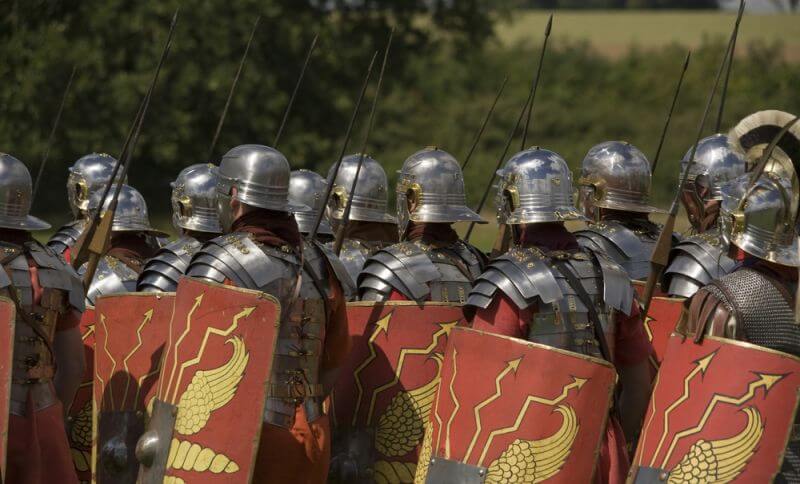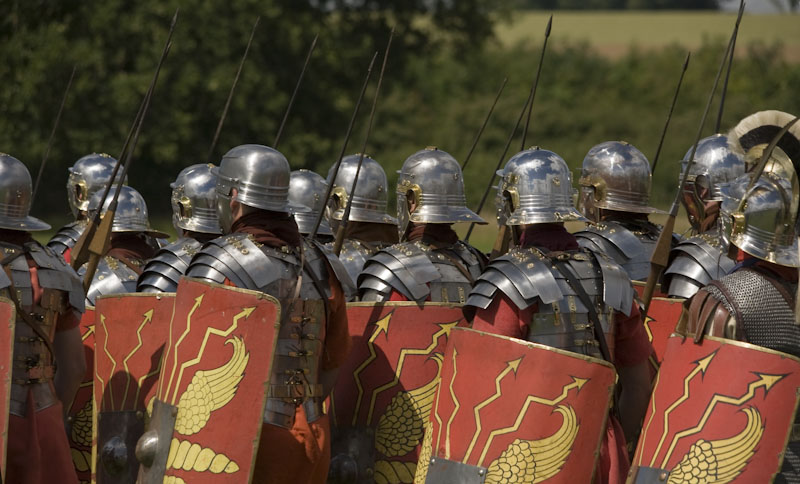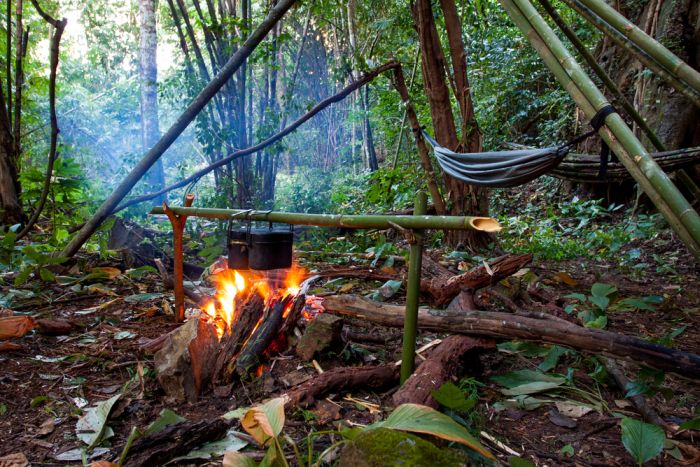The history of the world is filled with stories of one empire after another, each great in its own time. Amongst these, the Roman Empire stands out as one of the greats. While not the largest empire in either land area or population, it was one of the most influential, shaping European, Mid-Eastern, and North African history for hundreds of years after it’s collapse. The Romans not only conquered other people, but brought their brand of civilization to much of the known world at the time, integrating the people they conquered into their culture, not just ruling over them.
In the ancient world, building an empire required conquest. Therefore, much of the history of those empires is the history of warfare. Even empires which were contained within what are currently single nations today, like the Chinese, started out by one strong leader, backed by a strong army conquering rivaling leaders and forging a country out of the people.
Much of the history of invention ties in with the history of conquest as well. A large part of what made the Roman Army so formidable was the high quality of their weapons. In addition to that, they had developed the phalanx to a high level, fighting as a unit and giving them a clear advantage over their adversaries.
We see military technology changing society even today, with many of the inventions we depend on having originally been created for the military. These include radar, medivac helicopter flights, many medical procedures, and even the internet.
The Roman Legionnaire didn’t have that more modern technology, but what they had, they put to good use. The Legionnaires marched everywhere they went, so campaigns were extended forays, sometimes extending over years. So, fighting for Rome meant more than just being able to wield a gladius (sword) and a pilum (javelin). Roman soldiers became expert in building roads and fortifications, with some of those lasting even unto today.
Training
One of the things that set the Roman Army apart from many of their adversaries was that they were a professional army, not the more common army made up of peasants, using whatever implements or tools they had at hand. Roman soldiers trained hard, so that they could live up to the saying “Their drills are like bloodless battles and their battles are like bloody drills.”
Training prepares soldiers for combat, by making their actions and responses to their enemies almost automatic. By repeating the necessary actions over and over again, the soldier responds when needed, without having to stop and think. This makes them more effective in combat, saving lives and winning victories.
The same can be said for our survival training. Training isn’t about just testing out a piece of equipment, using it once to make sure it works, it’s about using it over and over again, to the point where you can use it just as well in the dark, in the middle of a storm, as you can use it sitting on your back patio.
I don’t think they’re doing it anymore, but Marines sued to practice disassembling and assembling their weapons, blindfolded. They had to know the weapons that they used so well, that they didn’t have to see the parts, in order to put it together; and, they had to do it quickly. For us, that would be like laying a fire or setting up a shelter, blindfolded.
Discipline
When a Roman Army unit ended their day’s march, they wouldn’t just build a camp, they would build a full fortification, erecting walls around their camp, with ditches and traps to hinder any enemy’s attack. They did more to defend themselves for one night’s stay, than most modern armies do for a permanent base. Granted, those modern bases are not in war zones, and they have to consider long-range weapons that the Romans couldn’t even imagine. Even so, the Romans didn’t take shortcuts for their own safety.
While I’m sure that Roman soldiers were just as interested in time off to take a drink and relax as the soldiers in any other army, throughout history, they had a singleness of purpose that has never been commonplace. Part of that was building those fortifications. Another part was building roads and other civic projects.
The Roman Army was probably one of the biggest construction companies in history. There was no, “I’m not going to build a road or an aqueduct, I’m a soldier” attitude. Being a soldier in the Roman army meant being a jack of all trades, especially a stone mason, as much of their road building and other edifices was hand-cut stone.
Organization
When I look at other ancient armies, I don’t see the level of organization that I see in the Roman Army. Yes, they had leaders who gave commands, but they didn’t have a full-blown military structure, like the Romans did. The structure of our modern armies follows the example of the Romans.
Organization can be essential in a time of war or crisis. Someone has to be making the decisions and passing on orders. If that isn’t settled ahead of time, you end up with anarchy. That’s never good for effective work or fighting. You may as well be on your own, for all the good your survival team will be to you.
The other part of this is the organizational discipline to follow orders. If you have accepted someone else as your leader, then do what they say; don’t argue about it. If you can’t accept their word as law, then get out of that survival group. You’re not really a member anyway. Rather than being an asset to the group, you’ll be an impediment to them; and rather than them being a benefit to you, they’ll just be something you’re tolerating.
Equipping
The right equipment was crucial to the Roman Army’s success. This included the aforementioned weapons, but also the rest of their equipment. The average Legionnaire carried a basic load of 60 pounds, including armor, weapons, tools and other survival essentials. Extra tools could bring a specific soldier’s load up to as much as 90 pounds.
People were hardier back then, which partially explains how they could carry so much. But that was only a starting point. Forced marches, carrying full gear, plus additional weight, was a regular part of Roman Army training, building up strength and endurance. In contrast to that, most of us haven’t carried our bug out bags further than from one room to the next.
The Legionnaire’s load included more than just their fighting gear. It included tools for the roadbuilding tasks they did. Within each squad of soldiers, they would have a complete set of tools to work with. Each individual soldier might only carry one shovel or mattock; but between them, they had what they needed.
One truly outstanding thing about how the Roman’s equipped their legionnaires was the quality of their gear. While there are many examples of ancient armor and armament from many different cultures, most of that is just the armor and arms of the wealthy elite. There are few examples of suits or armor or weapons that belonged to commoners. Only the nobles and perhaps a few royal guards had quality weapons, putting them at a huge disadvantage to the Romans.
Living Off the Land
The Roman Army wasn’t able to carry enough provisions with them for an extended campaign. That wasn’t an issue as long as they were traveling through Roman controlled lands. A legion on the march could stop in at local Roman strongholds for resupply; goods taken in the form of taxes from the local inhabitants. But what about when they passed outside of Roman lands?
This is much more like the type of situation we would run into during a bug out; passing through unfriendly lands. While the Romans could use threats and coercion to get supplies from locals, we can’t. All we can do, is the other part of what the Roman Army did, living off the land by hunting for food.
There are two schools of thought in the prepping and survival community about living off the land. One, looks at it like the way to go, thinking that we can do today, what our ancestors did a couple of hundred years ago. The other realizes that there isn’t as much game available and there are a lot more people who will be looking to hunt that game. The truth is probably somewhere between those extremes.
Roman soldiers did most of their hunting when they were passing through largely unoccupied lands. That changed the population to game ratio in their favor. The same would work for us, just as it did for them. Therefore, we must plan on getting as far away from civilization as possible, as quickly as possible. Then our chances of being able to find game and live off the land will increase.
More than Anything, They Were Self-Sufficient
More than anything, the Roman Legionnaires knew that it was up to them to survive; both in warfare and in the time between battles. Regardless of whether we’re talking about fighting a battle or building a road, they weren’t looking for someone to take over and rescue them. They knew it was up to them to do whatever was needed and that if they didn’t do it, they might not survive.
This is the essence of survival. Do what you have to do to take care of yourself. Don’t depend on others to do it for you. Even if you’re part of a survival group, don’t’ count on them to do what’s needed. I’ve seen too many survival groups that couldn’t survive, mostly because they didn’t know how to scale up their experimental projects.









radar | April 1, 2025
|
Excellent!!! And historical, exceedingly excellent
Stockton | April 15, 2025
|
Don’t forget, Roman troops planted grain along their path when they traveled so on their return trip, that same grain could be harvested.
Gary Follett | April 15, 2025
|
The phalanx was a Greek unit, not a Roman one. The Romans split up the phalanx into smaller, more flexible units that were able to respond to the vicissitudes of battle. The most important officer rank was the centurion, highly trained, disciplined, and motivated, who coordinated with other ranks and units to form a dynamic, many-toothed killing machine. The Roman legion bent but did not break. If it did, it could be subjected to decimation, the killing by lot of one tenth of the unit by its own comrades. The legionnaires were not necessarily the biggest or fiercest, but they were the best. They operated as a team, not a collection of all stars. Glory fell to Greece, but grandeur rained upon Rome. We inherit its brutal wisdom.